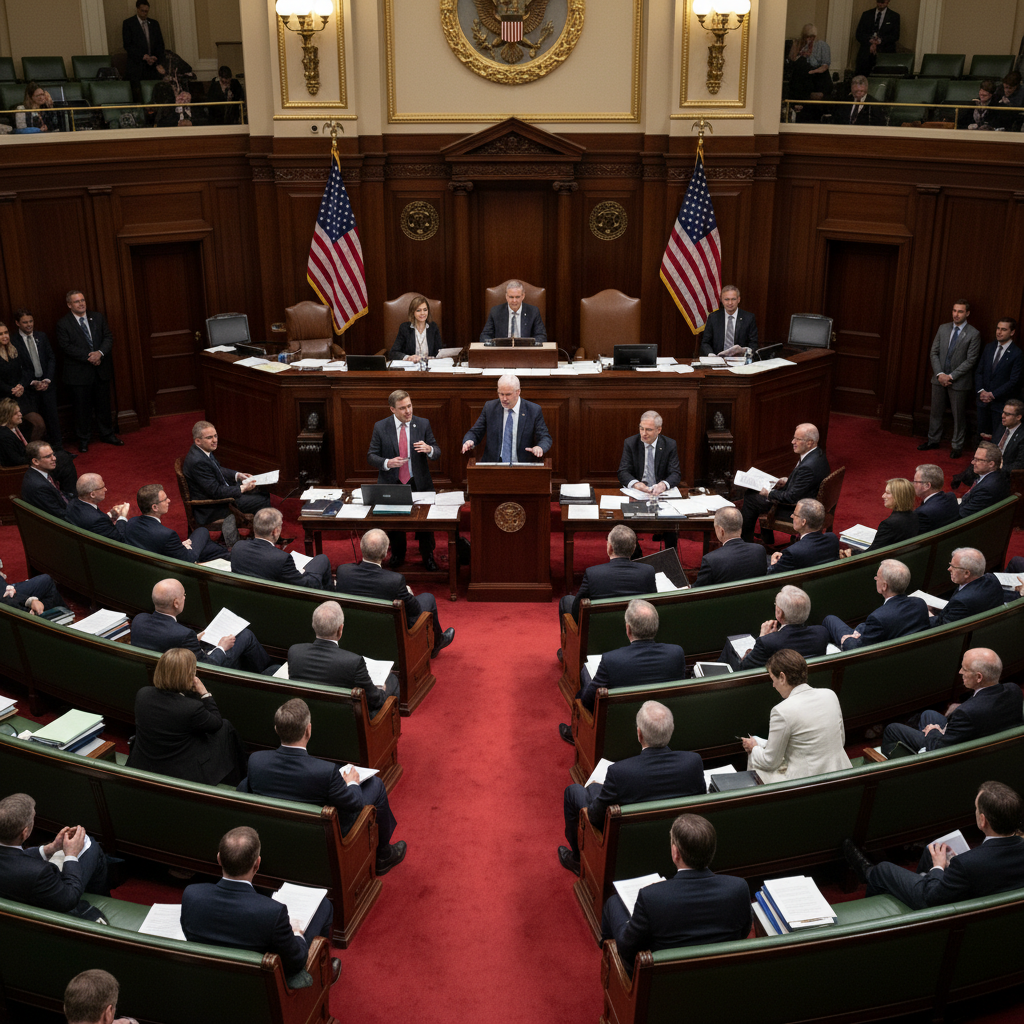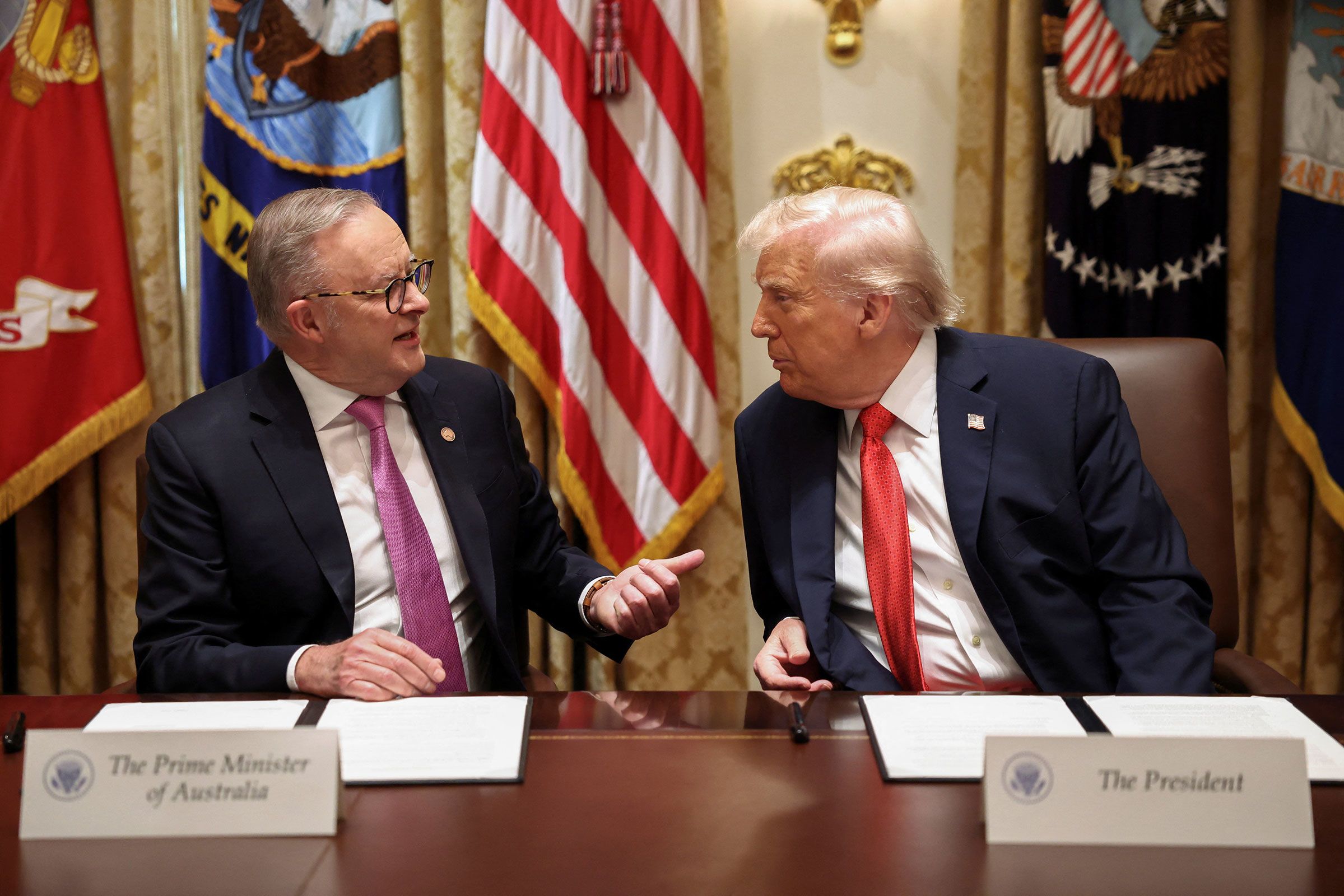
Senate Democrats Block GOP Stopgap Bill, Government Shutdown Enters 21st Day
The U.S. government shutdown continues into its 21st day after Senate Democrats blocked a Republican stopgap funding bill for the 11th time, citing demands to extend health care subsidies under the Affordable Care Act. The stalemate has led to widespread unpaid furloughs, including about 80% of National Nuclear Security Administration staff, raising national security concerns. Republicans proposed paying only "essential" workers during the shutdown, a move criticized by Democrats as politically divisive. The shutdown has also delayed federal projects and caused travel disruptions due to staffing shortages at airports. Meanwhile, President Trump signed an $8.5 billion rare earth minerals deal with Australia, signaling ongoing international diplomacy amid domestic gridlock. As political tensions persist, critical federal operations remain hampered, with no clear resolution in sight.
Summary
Senate Democrats again blocked Republicans’ stopgap funding bill amid ongoing government shutdown
The U.S. government shutdown continues as Senate Democrats once more blocked a Republican-led stopgap funding bill, prolonging the stalemate over health care subsidies. The impasse has severe consequences across federal agencies and workers, raising concerns about national security and economic impacts. Meanwhile, President Donald Trump and Australian Prime Minister Anthony Albanese signed a significant rare minerals agreement, illustrating ongoing diplomatic efforts amid domestic gridlock.
Key Points:
- Senate Democrats blocked the Republican stopgap funding bill for the 11th time with a 50-43 vote, maintaining the government shutdown into its 21st day.
- Federal workers, including Senate staffers, face continued unpaid furloughs; the National Nuclear Security Administration furloughed about 80% of its staff, sparking national security concerns.
- Republican leaders are pushing a bill to pay only “essential” federal workers during the shutdown, a proposal met with skepticism from Democrats.
- The shutdown causes delayed flights and disrupted federal projects, with funding paused for billions of dollars in infrastructure, particularly in Democratic strongholds.
- President Trump and Australian Prime Minister Albanese signed a $8.5 billion rare earth minerals deal, a strategic move amid US-China tensions.
---
Deepening Shutdown Standoff in the Senate
The Senate once again failed to advance a Republican stopgap bill aiming to fund the government through November 21. Democrats, holding the majority in the chamber on certain issues, blocked the proposal due to their insistence on extending enhanced health care subsidies under the Affordable Care Act (ACA), which Republicans refuse to include without first reopening the government. The vote resulted in a 50 to 43 count, with two Democrats, Senators Catherine Cortez Masto and Angus King, siding with the GOP.
Republican Senate Majority Leader John Thune signaled plans to introduce a separate measure to pay federal employees deemed "essential," including military personnel, but resisted Democrats' demands to extend that payment to furloughed workers. The shutdown thus persists as neither side concedes ground.
Republican Strategy and Democratic Concerns
Republican senators emphasize the responsibility lies with Democrats to break the stalemate. GOP Sen. Markwayne Mullin commented that Democrats could guarantee pay for all federal workers by voting for the stopgap funding bill but continue to withhold support. GOP Sen. John Kennedy expressed surprise at Thune’s move to advance pay for essential workers without the support of furloughed employees, calling the timing risky and forecasting numerous amendments.
On the other hand, Democrats argue the GOP’s strategy to pay only some federal employees is selective and politically motivated, giving President Trump authority to decide who is “essential” and deserves pay. Sen. Tim Kaine warned this creates a dangerous precedent, while House Minority Leader Hakeem Jeffries called the measure a “political ploy” designed to pit federal workers against each other.
Impacts Across Federal Agencies and Workforce
The shutdown’s effects are now palpable nationwide and within the federal workforce. Senate staff received notice they will no longer be paid for the remainder of the shutdown. More severely, the National Nuclear Security Administration (NNSA), responsible for maintaining and modernizing the U.S. nuclear arsenal, furloughed roughly 1,400 of its federal workers. Senate Armed Services Chairman Roger Wicker criticized the furloughs as unacceptable given national security priorities.
Energy Secretary Chris Wright underscored concerns about the risk the shutdown poses to the nuclear stockpile’s management, emphasizing the urgency of securing the arsenal and retaining critical contractors, about 3,000 of whom continue working.
Additionally, the Office of Management and Budget (OMB) defended its decision to freeze over $11 billion in projects managed by the Army Corps of Engineers. Internal communications revealed the administration is prioritizing funding realignment towards certain federal priorities, notably pausing infrastructure projects in Democratic-led “sanctuary” jurisdictions. Projects such as San Francisco waterfront park renovations, salmon habitat restoration, and bridge replacements in Massachusetts were among those delayed.
Travel and Operational Disruptions
Transportation Security Administration (TSA) staffing shortages caused unusually long waits at Hartsfield-Jackson Atlanta International Airport, despite TSA officers and air traffic controllers being deemed essential employees who must work without pay during the shutdown. Many controllers have called out sick or taken temporary jobs due to unpaid wages, complicating airport operations and increasing passenger wait times.
Political Dynamics and Negotiation Attempts
The government funding impasse extends amid complex political interplay. After over three weeks of shutdown, Senate Democrats maintain a firm stance on attaching healthcare subsidy extensions to funding legislation. Republicans, meanwhile, remain focused on reopening government prior to negotiations on policy matters.
House Speaker Mike Johnson has kept the House in prolonged recess, defending this as a strategy to pressure Senate Democrats. However, this approach has drawn criticism from within the Republican Party, including from Rep. Marjorie Taylor Greene, who urges an immediate return to legislative business.
White House economic adviser Kevin Hassett expressed optimism that the shutdown might end this week, citing the conclusion of the nationwide “No Kings” protests against President Trump as a catalyst for political movement. Nonetheless, he warned the administration may consider “stronger measures” to bring Democrats to the negotiation table if progress stalls.
Several Democrats, including Senator Mark Kelly, expressed willingness to resolve the shutdown if Republicans agree to negotiate on healthcare policy. Yet, broader Democratic leadership has refrained from significant concessions, asserting the critical nature of ACA subsidies to millions of Americans.
Continuing Foreign Policy Engagement Amid Domestic Shutdown
While Washington remains gridlocked, President Trump advances international diplomacy. Trump and Australian Prime Minister Anthony Albanese signed an $8.5 billion rare earth minerals agreement aimed at countering China’s dominance in critical mineral markets. Both nations committed $1 billion over six months to fund projects that enhance supply chains for these strategic resources essential to modern technologies.
Trump also held discussions regarding conflicts in Gaza, Ukraine, and tensions with Colombia. He warned Hamas of potential military action should the ceasefire be violated, insisted U.S. troops would not enter renewed regional conflict, and engaged with officials to pursue peace accords. Additionally, relations with Colombia deteriorated as the U.S. recalled its ambassador amid disputes over drug trafficking and military deployments.
Legal and Administrative Consequences
The shutdown has prompted notable judicial and workforce developments. Federal courts have furloughed non-essential workers, with the Supreme Court closing its building to the public but continuing case hearings. Furthermore, a federal judge temporarily blocked the Trump administration’s plan to lay off thousands of federal employees amid the shutdown, following legal challenges by unions.
Meanwhile, tens of thousands of federal workers remain furloughed or working unpaid, with back pay guaranteed only after a shutdown’s conclusion—raising financial strain concerns for many households.
---
As the government shutdown tightens its grip, it intensifies political divisions, hampers vital federal operations, and disrupts the lives of millions of Americans. While legislative efforts continue to find compromise, the path to resolution remains fraught with partisan conflict and strategic brinkmanship. The coming days are pivotal as lawmakers weigh concessions against escalating economic and national security risks.

Questions and answers
Q: Current status of US government shutdown
A: As of now, there is no active U.S. government shutdown. Congress has either passed or is in the process of negotiating funding bills to keep the federal government operational. Any potential shutdown is typically avoided by passing temporary funding measures known as stopgap bills.
Q: Who blocked the stopgap funding bill
A: The stoppage of a stopgap funding bill often involves opposition from certain members of Congress, typically due to disagreements over budget priorities or policy issues. Specific lawmakers or factions may block the bill, but the exact individuals depend on the particular vote or situation. Generally, opposition can come from both parties depending on the political context.
Q: Impact of government shutdown on federal workers
A: A government shutdown typically results in federal workers being furloughed or required to work without immediate pay. Essential services continue, but many non-essential federal employees are sent home until funding is restored. This leads to financial strain for workers and delays in government services that affect the public.
Q: Details of Trump and Albanese rare minerals agreement
A: There have been reports of discussions between former President Trump and Australian Prime Minister Albanese regarding rare minerals, focusing on securing supply chains for critical minerals needed in technology and defense. The agreement aims to strengthen cooperation in mining and trade of these resources, although detailed specifics have not been fully disclosed to the public.
Q: Senate vote on government funding bill
A: The Senate vote on government funding bills is a crucial step in avoiding a government shutdown. Senators debate and vote on whether to approve continuing resolutions or full appropriations bills to fund federal operations. The outcome can reflect partisan divides and significantly impacts the government's ability to function without interruption.
Key Entities
Senate Democrats: Senate Democrats are members of the United States Senate representing the Democratic Party, often advocating for progressive policies. They play a key role in shaping legislation and confirming appointments in the federal government.
Republicans: Republicans are members of the United States Republican Party, which generally supports conservative and free-market principles. In the Senate, they often serve as the opposition party to the Democrats, influencing policy debates and legislative outcomes.
President Donald Trump: Donald Trump served as the 45th President of the United States from 2017 to 2021, representing the Republican Party. His administration was marked by a focus on deregulation, immigration policies, and reshaping U.S. foreign relations.
Australian Prime Minister Anthony Albanese: Anthony Albanese is the Prime Minister of Australia and leader of the Australian Labor Party, having assumed office in 2022. He is known for prioritizing domestic economic reform and strengthening Australia’s international alliances.
National Nuclear Security Administration: The National Nuclear Security Administration (NNSA) is a U.S. federal agency responsible for enhancing national security through nuclear weapons management and nonproliferation efforts. It oversees the safety, security, and reliability of the nation’s nuclear arsenal.
External articles
- Americans In All 50 States Brace For Mas...
- October 20, 2025: Government shutdown and Trump ...
- Senate Democrats reject GOP-led funding stopgap for 11th ...
YouTube Video
Title: US and Australia Sign $8.5B Rare earth minerals deal
URL: https://www.youtube.com/shorts/0wRq86Fpauc
Politics